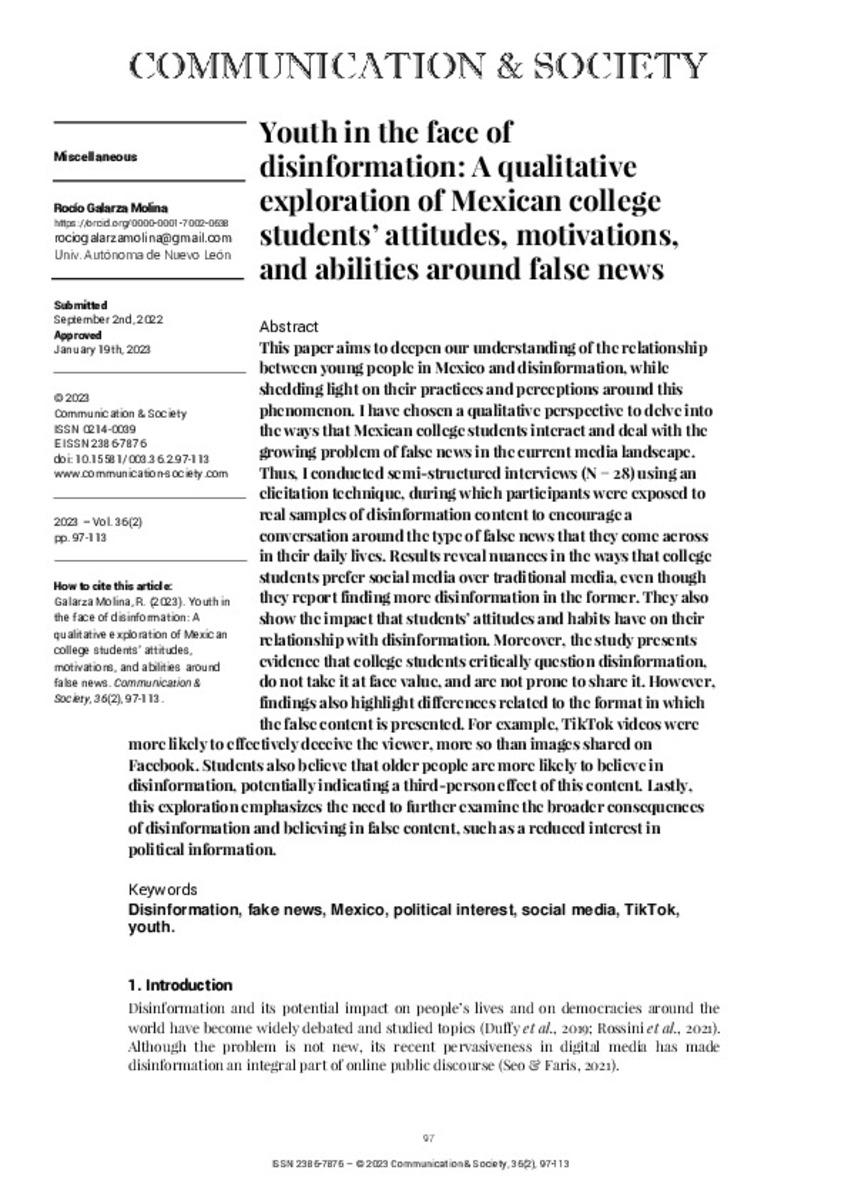Full metadata record
| DC Field | Value | Language |
|---|---|---|
| dc.creator | Galarza-Molina, R. (Rocío) | - |
| dc.date.accessioned | 2023-04-04 | - |
| dc.date.accessioned | 2023-05-29T07:48:23Z | - |
| dc.date.available | 2023-05-29T07:48:23Z | - |
| dc.date.issued | 2023 | - |
| dc.identifier.citation | Galarza-Molina, R. (Rocío). "Youth in the face of disinformation: A qualitative exploration of Mexican college students’ attitudes, motivations, and abilities around false news". Communication & Society. 36 (2), 2023, 97 - 113 | es |
| dc.identifier.issn | 2386-7876 | - |
| dc.identifier.uri | https://hdl.handle.net/10171/66428 | - |
| dc.description.abstract | This paper aims to deepen our understanding of the relationship between young people in Mexico and disinformation, while shedding light on their practices and perceptions around this phenomenon. I have chosen a qualitative perspective to delve into the ways that Mexican college students interact and deal with the growing problem of false news in the current media landscape. Thus, I conducted semi-structured interviews (N = 28) using an elicitation technique, during which participants were exposed to real samples of disinformation content to encourage a conversation around the type of false news that they come across in their daily lives. Results reveal nuances in the ways that college students prefer social media over traditional media, even though they report finding more disinformation in the former. They also show the impact that students’ attitudes and habits have on their relationship with disinformation. Moreover, the study presents evidence that college students critically question disinformation, do not take it at face value, and are not prone to share it. However, findings also highlight differences related to the format in which the false content is presented. For example, TikTok videos were more likely to effectively deceive the viewer, more so than images shared on Facebook. Students also believe that older people are more likely to believe in disinformation, potentially indicating a third-person effect of this content. Lastly, this exploration emphasizes the need to further examine the broader consequences of disinformation and believing in false content, such as a reduced interest in political information. | en_US |
| dc.language.iso | eng | - |
| dc.publisher | Servicio de Publicaciones de la Universidad de Navarra | es_ES |
| dc.rights | info:eu-repo/semantics/openAccess | es_ES |
| dc.title | Youth in the face of disinformation: A qualitative exploration of Mexican college students’ attitudes, motivations, and abilities around false news | en_US |
| dc.type | info:eu-repo/semantics/article | es_ES |
| dc.identifier.doi | 10.15581/003.36.2.97-113 | - |
| dadun.citation.endingPage | 113 | - |
| dadun.citation.number | 2 | - |
| dadun.citation.publicationName | Communication & Society | - |
| dadun.citation.startingPage | 97 | - |
| dadun.citation.volume | 36 | - |
Files in This Item:
Statistics and impact
Items in Dadun are protected by copyright, with all rights reserved, unless otherwise indicated.






